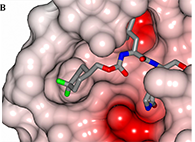K-State researchers continue battling MERS and related bat coronaviruses of pandemic potential
Monday, Aug. 12, 2024
MANHATTAN — Virologists in Kansas State University's College of Veterinary Medicine will lead a new round of pioneering research about Middle East respiratory syndrome, or MERS, and related bat coronaviruses with pandemic potential.
Kyeong-Ok "KC" Chang, professor of virology, and Yunjeong Kim, associate professor of diagnostic medicine and pathobiology, are continuing a research collaboration begun in 2018 with William C. Groutas, a medicinal chemist at Wichita State University, and Stanley Perlman, a virologist at the University of Iowa. Their project, "Small Molecule Protease Inhibitors against MERS-CoV and Coronaviruses of Pandemic Potential," has been approved for a five-year, $3.6 million grant from the National Institutes of Health-National Institute of Allergy and Infectious Diseases.
"MERS coronavirus emerged suddenly in 2012 as the cause of severe respiratory illness in humans," Chang said. "Despite the high mortality rate and the significant potential for a public health emergency, there are no FDA-approved vaccines or antiviral drugs for MERS. Consequently, there is an urgent and unmet need for the development of small-molecule drugs to control MERS coronavirus infection."
Chang said their work has found a promising compound that can help serve as a launching pad for the development of orally bioavailable MERS-CoV-specific antivirals.
"Efforts to develop general strategies to mitigate the impact of future pandemics have been limited," Kim said. "Coronavirus 3C-like protease, or 3CLpro, is a well-characterized therapeutic target as it processes most cleavage sites on virus polyproteins and is essential for virus replication."
Novel human coronaviruses have emerged multiple times in human populations from wildlife reservoirs, especially bats.
Kim said this team's work will involve exploring and utilizing the generated inhibitors against the 3CLpro of bat sarbecoviruses and merbecoviruses within the Betacoronavirus genus, as these viruses pose a high risk of future spillover into humans.
The funding will also allow for the recruitment of personnel at K-State and Wichita State and help retain existing team members who were recruited with the original grant in 2018.

